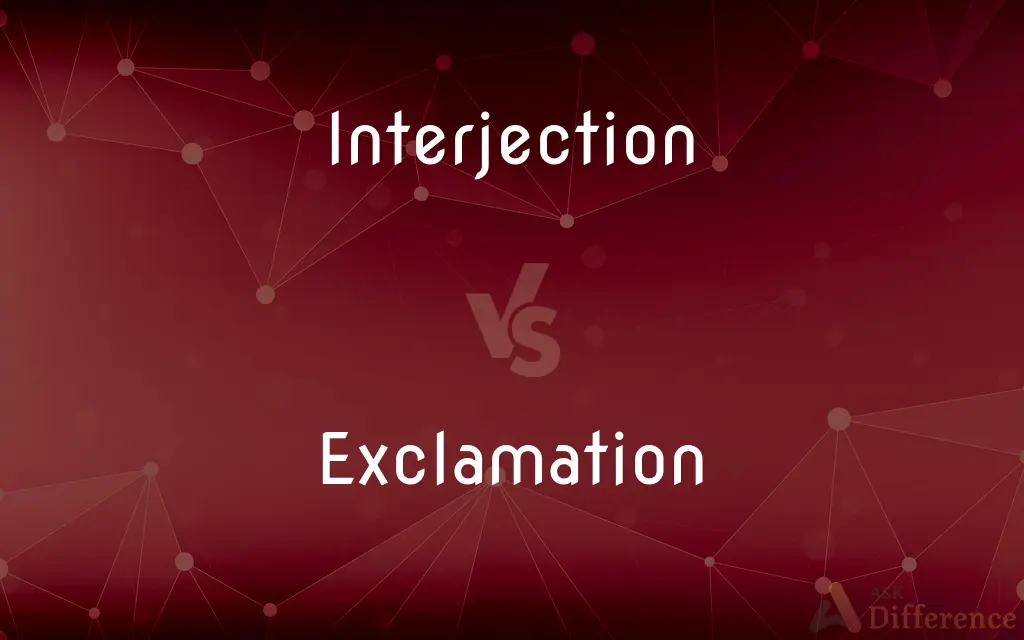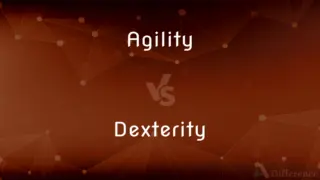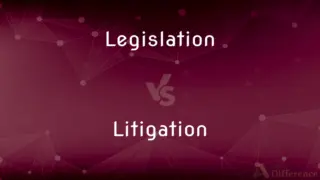Interjection vs. Exclamation — What's the Difference?
By Maham Liaqat & Urooj Arif — Updated on March 16, 2024
Interjections are words or phrases that express emotion or sentiment without being grammatically connected to other sentences, whereas exclamations are sentences or expressions that convey strong emotions, often containing interjections.

Difference Between Interjection and Exclamation
Table of Contents
ADVERTISEMENT
Key Differences
Interjections serve as a linguistic tool to express feelings, reactions, or emotions spontaneously. These can be words such as "Wow!" or "Ouch!" that stand alone or are inserted into sentences to convey the speaker's emotional response. They are versatile, being able to express a wide range of emotions, from surprise to pain, and do not typically form grammatically structured relationships with other parts of a sentence. Whereas, exclamations are sentences or phrases used to express strong feelings, such as excitement, anger, or surprise, and often end with an exclamation mark. They can include interjections but are characterized by their ability to form complete sentences or phrases that clearly communicate an intense emotional state.
Interjections are primarily defined by their function in language as a means to convey emotion quickly and efficiently, often outside the constraints of syntax. For example, "Ah!" might express realization or surprise, and "Eww!" expresses disgust. On the other hand, exclamations construct a more complete thought or sentence, such as "What a beautiful view!" or "I can't believe you did that!" These sentences go beyond the immediate emotional reaction to provide context or additional information related to the emotion being expressed.
The use of interjections can be somewhat informal and is often found in casual conversation or expressive writing. They add color and emotion to speech or text, allowing for a more nuanced expression of feelings. Exclamations, while also used to express strong emotions, do so within a more structured or elaborate framework, making them versatile for both informal and formal contexts, depending on the language and situation.
Interjections do not require additional context to be understood and are universally recognized across languages, though specific words may vary. Exclamations, however, often rely on the context provided by the sentence structure or the content of the exclamation to fully convey the speaker's message or emotional state.
While interjections are a part of speech, acting as standalone expressions of emotion, exclamations encompass a broader range of expressions, including sentences structured to emphasize a strong emotional response. Both play crucial roles in adding expressiveness and emotional depth to language but do so through different mechanisms and levels of structure.
ADVERTISEMENT
Comparison Chart
Definition
A word or phrase expressing emotion or reaction without grammatical connection.
A sentence or phrase expressing strong emotion, often containing interjections.
Examples
"Wow!", "Ouch!", "Ah!"
"What a great game!", "I can't believe it!"
Function
Convey emotions spontaneously.
Convey strong emotions with more context or information.
Formality
Generally informal.
Can be informal or formal, depending on context.
Grammatical Role
Standalone or inserted, without syntactic relation to other sentence elements.
Can form complete sentences or structured phrases.
Universality
Universal across languages, though specific expressions vary.
Context-dependent for full understanding.
Emotional Range
Wide, covering surprise, happiness, sadness, etc.
Strong emotions, with potential for nuanced expression through additional context.
Compare with Definitions
Interjection
Expresses sudden emotion.
Wow! That's amazing.
Exclamation
Encompasses a range of expressions.
Stop that right now!
Interjection
Often informal.
Yikes, that was close.
Exclamation
Expresses strong feelings.
What a wonderful world!
Interjection
Universal in function.
Eww, that's gross.
Exclamation
Provides context or information.
That's exactly what I needed!
Interjection
Standalone emotional reaction.
Ouch! That hurt.
Exclamation
Can form complete sentences.
I can't believe we won!
Interjection
Adds expressiveness.
Aha, I found it!
Exclamation
Versatile in formality.
How incredible this discovery is!
Interjection
An interjection is a word or expression that occurs as an utterance on its own and expresses a spontaneous feeling or reaction. It is a diverse category, encompassing many different parts of speech, such as exclamations (ouch!, wow!), curses (damn!), greetings (hey, bye), response particles (okay, oh!, m-hm, huh?), hesitation markers (uh, er, um) and other words (stop, cool).
Exclamation
An abrupt, forceful utterance
An exclamation of delight.
Interjection
A sudden, short utterance; an ejaculation.
Exclamation
An outcry, as of protest.
Interjection
The part of speech that usually expresses emotion and is capable of standing alone.
Exclamation
(Grammar) An interjection.
Interjection
Any of the words belonging to this part of speech, such as Ugh! or Wow!
Exclamation
A loud calling or crying out, for example as in surprise, pain, grief, joy, anger, etc.
Interjection
(grammar) An exclamation or filled pause; a word or phrase with no particular grammatical relation to a sentence, often an expression of emotion.
Exclamation
A word expressing outcry; an interjection
Interjection
An interruption; something interjected
Exclamation
(linguistics) A clause type used to make an exclamatory statement: What a mess they made!; How stupid I was!
Interjection
The act of interjecting or throwing between; also, that which is interjected.
The interjection of laughing.
Exclamation
An exclamation mark
Interjection
A word or form of speech thrown in to express emotion or feeling, as O! Alas! Ha ha! Begone! etc. Compare Exclamation.
An interjection implies a meaning which it would require a whole grammatical sentence to expound, and it may be regarded as the rudiment of such a sentence. But it is a confusion of thought to rank it among the parts of speech.
How now! interjections? Why, then, some be of laughing, as, ah, ha, he!
Exclamation
A loud calling or crying out; outcry; loud or emphatic utterance; vehement vociferation; clamor; that which is cried out, as an expression of feeling; sudden expression of sound or words indicative of emotion, as in surprise, pain, grief, joy, anger, etc.
Exclamations against abuses in the church.
Thus will I drown your exclamations.
A festive exclamation not unsuited to the occasion.
Interjection
An abrupt emphatic exclamation expressing emotion
Exclamation
A word expressing outcry; an interjection; a word expressing passion, as wonder, fear, or grief.
Interjection
The action of interjecting or interposing an action or remark that interrupts
Exclamation
A mark or sign by which outcry or emphatic utterance is marked; thus [!]; - called also exclamation point.
Exclamation
An abrupt excited utterance;
She gave an exclamation of delight
There was much exclaiming over it
Exclamation
A loud complaint or protest or reproach
Exclamation
An exclamatory rhetorical device;
O tempore! O mores
Common Curiosities
Are interjections always informal?
While typically informal, interjections can be used in formal writing or speech to convey strong or sudden emotions.
What distinguishes an interjection from an exclamation?
An interjection is a specific part of speech used to express emotion spontaneously, while an exclamation is a broader expression that conveys strong emotions and can form complete sentences.
How do exclamations add to the expressiveness of language?
Exclamations enhance language by providing strong emotional responses that can include detailed context or information, allowing for a more nuanced expression.
How do different cultures use interjections?
While the function of interjections is universal, the specific words or sounds used as interjections can vary significantly across cultures.
Can exclamations contain interjections?
Yes, exclamations often contain interjections as part of their structure to express emotion vividly.
Is it appropriate to use exclamations in formal writing?
While generally suited for informal contexts, exclamations can be used in formal writing if carefully chosen to convey strong emotions or emphasize points effectively.
Are there rules for using interjections and exclamations?
The primary rule is to use them appropriately to the tone and context of the conversation or text, with interjections being more flexible and exclamations requiring a structured approach.
Can an interjection form a complete sentence?
Interjections are usually not complete sentences by themselves but can be part of sentences or stand alone to express emotion.
Can the emotional intensity of an exclamation be modified?
Yes, the intensity of an exclamation can be modified by the choice of words, the presence of interjections, and punctuation, particularly the use of exclamation marks.
How do interjections and exclamations impact spoken language?
They add emotional depth and expressiveness, allowing speakers to convey feelings and reactions more vividly and spontaneously.
Share Your Discovery

Previous Comparison
Agility vs. Dexterity
Next Comparison
Legislation vs. LitigationAuthor Spotlight
Written by
Maham LiaqatCo-written by
Urooj ArifUrooj is a skilled content writer at Ask Difference, known for her exceptional ability to simplify complex topics into engaging and informative content. With a passion for research and a flair for clear, concise writing, she consistently delivers articles that resonate with our diverse audience.
















































